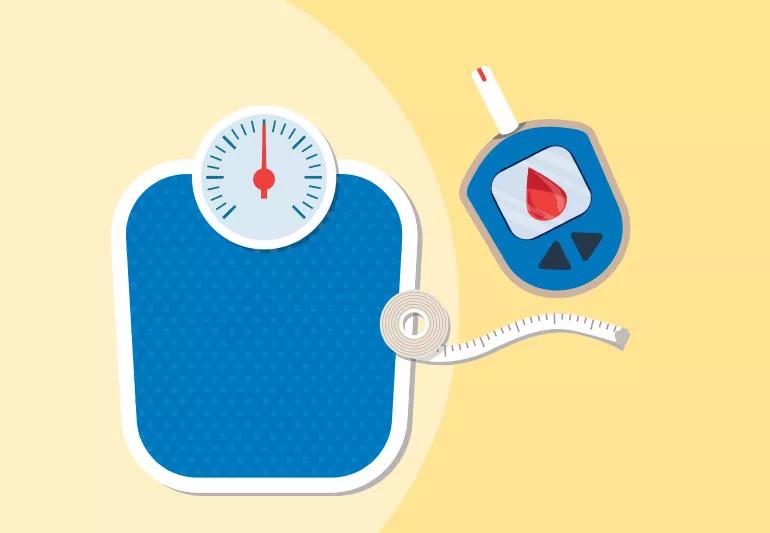And the one thing you can do to turn diabetes around

Image content: This image is available to view online.
View image online (https://assets.clevelandclinic.org/transform/fe33e57c-0bdc-494d-bc32-1ca02a78b450/diabesityWeight-1254443964-770x533-1_jpg)
Dibesity diabetes and weight
You’ve probably heard of diabetes. And obesity. But what the heck is diabesity? It’s a new medical term for a condition that’s becoming a worldwide epidemic. And if you have it, losing weight could cure the condition. Endocrinologist Jay Waddadar, MD, explains.
Advertisement
Cleveland Clinic is a non-profit academic medical center. Advertising on our site helps support our mission. We do not endorse non-Cleveland Clinic products or services. Policy
Diabesity isn’t an official diagnosis. It means you have both obesity and Type 2 diabetes. Together, these closely related conditions greatly increase your risk of heart disease — the leading cause of death in the country.
“Diabesity is a disease with enormous potential to cause ill effects on the body in the long run,” says Dr. Waddadar. “Some people don’t understand the importance of taking the steps to manage it because they’re feeling well at the time of diagnosis. But that’s a big mistake. Diabesity is a silent disease that damages your body if it’s not controlled, even while you feel fine.”
The good news: You can prevent, control and even reverse it. Dr. Waddadar shares more about how obesity causes and worsens diabetes. And why losing weight holds the key to possibly making it all go away.
Having obesity makes you more likely to develop diabetes, the condition of having too much glucose (sugar) circulating in your bloodstream. Obesity also causes diabetes to worsen faster.
Here’s what happens: Managing the level of glucose in your blood is the job of the pancreas. The pancreas creates insulin, which is a hormone that moves glucose out of your blood. Normally, insulin transports glucose to your muscles to use right away for energy or to the liver, where it’s stored for later.
Advertisement
But when you have diabesity, your cells resist letting insulin move glucose into them. To make matters worse, the area of your liver where excess glucose is usually stored is filled with fat. It’s like trying to put furniture in a room that’s already packed. “There’s no space for anything else,” Dr. Waddadar explains.
With nowhere to be stored, the glucose remains in the bloodstream. “So your pancreas creates even more insulin trying to accomplish the job of moving glucose out of the blood,” says Dr. Waddadar. “It’s trying to push against the resistance created by the fat. Your pancreas becomes overworked, and as a result, it wears out. It starts producing less insulin. Diabetes develops and then quickly worsens if the fat resistance remains.”
If you have obesity, you’re about six times more likely to develop Type 2 diabetes than those at a healthy weight. But not everyone with obesity automatically gets diabetes. Other factors are likely at play, too, including:
It may be that some people with obesity can produce more insulin without overtaxing the pancreas, says Dr. Waddadar. Others might be limited in insulin production, making it more likely that obesity will lead to diabesity.
Since excess fat worsens diabetes, losing weight can greatly improve the condition. “When you have diabesity, you may start with one medication to get the pancreas to produce enough insulin. But very soon and much earlier, you need two or more medicines for diabetes. But if you lose weight, you may do fine with just one medication or even go off medication entirely,” explains Dr. Waddadar.
Losing as little as 5% to 10% of your overall body weight can greatly improve Type 2 diabetes. For example, if you weigh 200 pounds, 5% of that is 10 pounds. So bringing your weight down to 190 pounds can significantly help your health. “The first treatment goal for diabesity is to get to and maintain a healthy weight along with eating a low-carb diet,” Dr. Waddadar says.
Changing your diet and increasing exercise to lose weight can be challenging. But the hard work is worth it to avoid serious complications of uncontrolled diabetes like heart disease, kidney failure and nerve damage.
Ready to take the first step toward better health? Ask your doctor for resources and guidance to help you beat diabetes.
Advertisement

Sign up for our Health Essentials emails for expert guidance on nutrition, fitness, sleep, skin care and more.
Learn more about our editorial process.
Advertisement
Foods high in protein and fiber can help suppress your appetite, as can exercise, sleep and other healthy habits
This diabetes drug is quickly gaining attention for weight loss potential
They’re legit health conditions, and not entirely in your control
Your weight-loss plateau isn’t a question of willpower, it’s your body fighting back
What we often get wrong and how it can be managed
Keto can reduce blood sugar, but that doesn’t mean it’s right for everyone
Maintaining a healthy weight, focusing on exercise and eating a well-balanced diet can improve your overall metabolic health
This diabetes medication can treat obesity, but it’s not for people who just want to drop a few pounds
Although it could be used as a moisturizer, this new trend is not recommended
Communicating clear limits helps protect your time, energy and emotional well-being
High cholesterol can be genetic, but testing and treatment can lower your heart disease risk